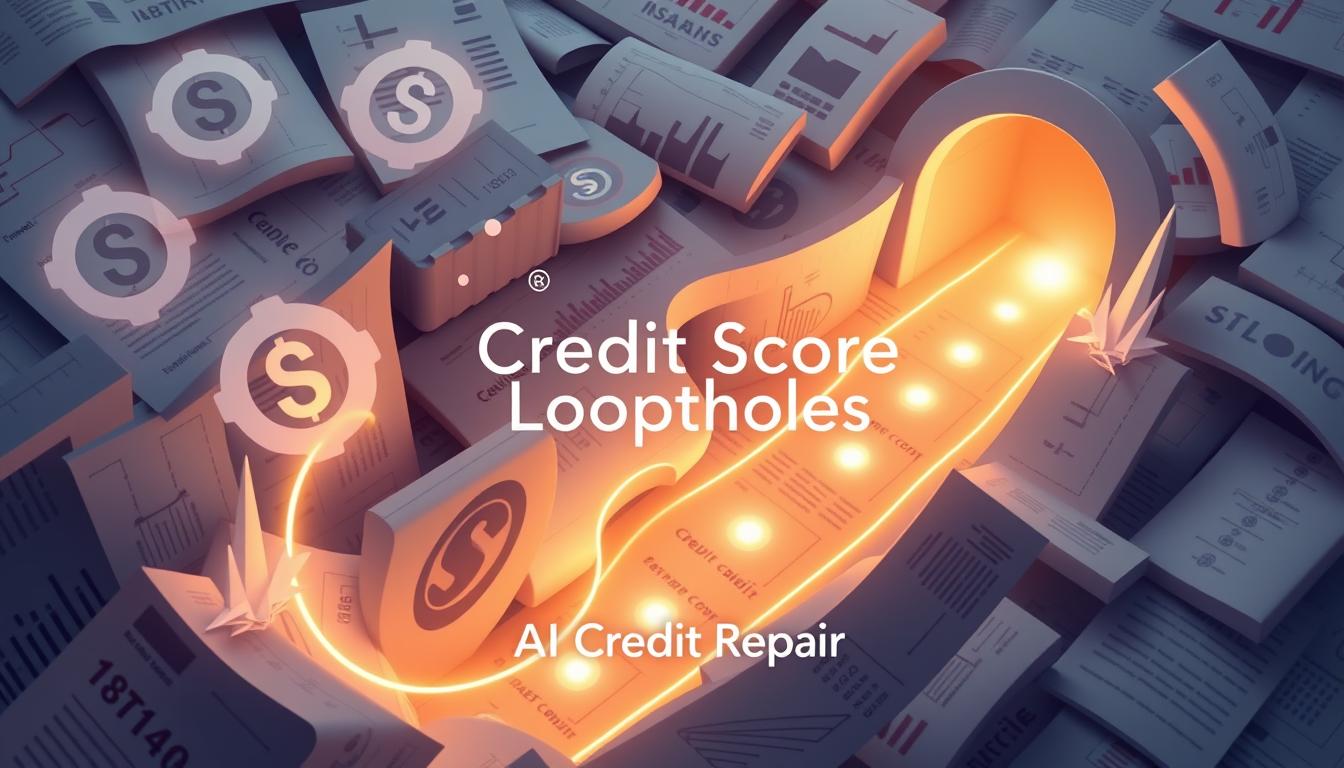Your credit score is crucial in today’s financial world. It can unlock opportunities for better loan rates and top credit cards. This guide reveals secret strategies to boost your creditworthiness quickly and legally.
We’ll show you how to master the credit system. You’ll learn ways to elevate your financial standing. These insider tricks can help improve your credit score fast.
Key Takeaways
- Discover the power of credit score loopholes to quickly improve your credit rating
- Learn how to dispute errors on your credit report and remove negative items
- Understand the benefits and risks of becoming an authorized user on someone else’s account
- Optimize your credit utilization ratio and leverage credit limit increases
- Strategically use balance transfers to consolidate debt and boost your score
- Negotiate with creditors to remove derogatory marks and improve your credit profile
- Establish new credit accounts responsibly to build a strong credit history
Understanding Credit Score Loopholes
Credit score loopholes are hidden strategies to boost your credit score quickly. These legal techniques use credit system quirks to your advantage. They help improve your creditworthiness more effectively than standard methods.
What Are Credit Score Loopholes?
Credit score loopholes are specific actions that positively impact your credit score. These include disputing credit report errors and becoming an authorized user on accounts.
Another strategy is maintaining a healthy credit utilization ratio. By using these loopholes, you can better control your credit profile. This positioning can lead to improved financial opportunities.
Why Do Credit Score Loopholes Matter?
Your credit score is crucial for lenders evaluating your creditworthiness. It determines terms for loans, credit cards, and mortgages. By leveraging credit score loopholes, you can improve your score faster.
This can result in significant benefits. You may secure lower interest rates on loans and credit cards. You could qualify for better mortgage terms and higher loan amounts.
- Securing lower interest rates on loans and credit cards
- Qualifying for better mortgage terms and higher loan amounts
- Gaining access to more favorable insurance rates
- Enhancing your overall financial flexibility and stability
Using these credit score loopholes can transform your financial journey. It empowers you to control your credit and unlock new opportunities.
Disputing Errors on Your Credit Report
A healthy credit score is vital for many aspects of life. It affects loan rates, apartment rentals, and even job prospects. Errors on your credit report can hurt your financial goals.
You have the power to dispute and fix these mistakes. By doing so, you can boost your credit score significantly.
Disputing errors is a powerful credit score loophole. Incorrect account information, fraudulent activities, or outdated records can harm your credit score. Disputing these errors with credit bureaus can lead to their removal.
This process can greatly improve your credit profile. It’s an effective way to enhance your financial standing.
- Obtain a copy of your credit report from all three major credit bureaus: Equifax, Experian, and TransUnion.
- Carefully review each report for any discrepancies, errors, or inaccuracies.
- Gather supporting documentation, such as bank statements, billing records, or correspondence, to substantiate your claims.
- Submit a formal dispute to the credit bureau(s) responsible for the incorrect information.
- Follow up on the dispute process and ensure the credit bureau(s) investigate and rectify the errors on your credit report.
Taking time to correct inaccuracies in your credit reports can unlock this powerful loophole. It’s an investment in your credit health that pays off.
A higher credit score brings numerous benefits. Start the process today and watch your financial standing improve.
| Common Credit Report Errors | Impact on Credit Score |
|---|---|
| Incorrect account information | Lowers credit score |
| Fraudulent activities | Significantly damages credit score |
| Outdated records | Negatively affects credit score |
“Disputing errors on your credit report is one of the most effective ways to boost your credit score and improve your financial standing.
Becoming an Authorized User
Adding yourself as an authorized user on someone’s credit card can boost your credit score. This strategy reflects the primary cardholder’s account history and credit limit on your report. It’s a powerful tool, but understanding the benefits and risks is crucial.
How Authorized User Accounts Work
As an authorized user, you can use the primary cardholder’s credit card. However, you’re not legally responsible for the account. The primary cardholder maintains full control and liability.
Their credit activity can impact your credit score positively or negatively. This depends on how well they manage their credit.
Risks and Benefits of Authorized User Status
- Benefits:
- Potential boost to your credit score if the primary cardholder has a long history of responsible credit use and a high credit limit.
- Opportunity to build credit without having to open a new account or take out a loan.
- Risks:
- If the primary cardholder mismanages the account, it can negatively impact your credit score.
- Potential for the primary cardholder to misuse the account, leading to financial liability for the authorized user.
Being an authorized user can be a powerful credit score loophole. Consider the benefits and risks carefully before taking this step. Understanding how these accounts affect your score helps make informed financial decisions.
credit score loopholes
Did you know there are legal credit score loopholes to boost your creditworthiness? These credit boosting techniques can unlock financial opportunities. From maintaining healthy credit utilization to using balance transfers, you can improve your credit score.
A key strategy to improve credit score is maintaining a healthy credit utilization ratio. This measures your credit use compared to your total available credit. Experts suggest keeping utilization below 30% to show responsible credit management.
Another effective legal credit score loophole is negotiating with creditors. If you have a good payment history, ask for a lower interest rate. You could also request a higher credit limit. These actions can positively impact your credit score.
| Credit Boosting Technique | Description | Potential Impact on Credit Score |
|---|---|---|
| Maintaining a Healthy Credit Utilization Ratio | Keep your credit utilization below 30% to demonstrate responsible credit management. | Positive impact on your credit score by showing lenders that you’re not overextending your credit. |
| Negotiating with Creditors | Ask your creditors for a lower interest rate or a higher credit limit if you have a good payment history. | Positive impact on your credit score by improving your credit utilization ratio and reducing interest charges. |
| Strategically Using Balance Transfers | Transfer high-interest balances to a new credit card with a lower interest rate to save money and improve your credit utilization. | Positive impact on your credit score by reducing your overall credit utilization and demonstrating responsible credit management. |
Using these credit score loopholes can help you navigate the credit system more effectively. They can improve your financial opportunities. Find techniques that work best for your unique financial situation.

“The key to unlocking your financial potential is understanding the credit system and leveraging the right legal credit score loopholes.”
Maintaining a Healthy Credit Utilization Ratio
Your credit utilization ratio impacts your credit score. It’s the amount of credit you use versus your total available credit. A low ratio, under 30%, can boost your score. Keeping balances low shows responsible credit management.
What Is a Good Credit Utilization Ratio?
Aim to keep your credit utilization ratio below 30%. This means using less than 30% of your total available credit. For example, with a $10,000 credit limit, keep balances under $3,000.
A low ratio shows lenders you’re not overextending your credit. A high ratio can signal financial stress and lower your score. Low balances demonstrate responsible credit use.
“Keeping your credit utilization ratio low is one of the best ways to improve your credit score and maintain a healthy financial profile.”
- Monitor your credit utilization ratio regularly.
- Pay down balances to keep your utilization below 30%.
- Request credit limit increases to improve your ratio.
- Avoid maxing out your credit cards.
Use these tips to improve your credit utilization ratio. A healthy ratio can boost your credit score. This can help you achieve your financial goals.
Leveraging Credit Limit Increases
Boosting your credit score can be achieved by increasing your credit limits. This strategy improves your credit utilization ratio, a key factor in credit scores. Higher limits give you more available credit, showcasing responsible credit management.
Here are some strategies to help you get credit limit increases and increase your credit limits:
- Monitor your credit report and credit utilization. Keep your utilization ratio below 30% to become an attractive candidate for limit increases.
- Request credit limit increases regularly. Many issuers will raise your limit if asked, especially with a history of timely payments.
- Leverage your credit history and income. Show evidence of creditworthiness, such as steady income or long credit history, to increase chances.
- Consider product upgrades. Some issuers may offer higher limits when upgrading to premium or specialized credit cards.
Implementing these strategies to increase credit limits can improve your credit score. It can also enhance your overall financial well-being.
| Advantage | Explanation |
|---|---|
| Improved Credit Utilization Ratio | A higher credit limit reduces your credit utilization, which is a significant factor in your credit score calculation. |
| Increased Available Credit | More available credit can provide you with greater financial flexibility and a better credit mix. |
| Responsible Credit Management | Demonstrating your ability to handle increased credit limits responsibly can signal to lenders that you are a low-risk borrower. |

“Leveraging credit limit increases is a smart strategy for boosting your credit score and financial well-being. By taking proactive steps to increase your limits, you can unlock the power of credit and improve your overall financial health.”
Strategic Use of Balance Transfers
Balance transfer credit cards can help you build credit. They let you move high-interest balances to a card with lower rates. This reduces your debt and improves your credit utilization ratio, boosting your credit score.
When to Consider a Balance Transfer
Look into balance transfers if you have lots of high-interest credit card debt. Take advantage of 0% APR promotions, usually lasting 12 to 21 months. Use this time to pay down your transferred balance.
This strategy can save you money on interest charges. It can also enhance your credit profile over time.
Potential Drawbacks of Balance Transfers
Balance transfers have benefits, but also some drawbacks. Transfer fees, often 3% to 5% of the amount moved, can eat into your savings.
If you can’t pay off the balance during the promo period, you’ll face higher interest. This rate may exceed your original card’s rate.
| Benefits of Balance Transfers | Risks of Balance Transfers |
|---|---|
|
|
Balance transfer cards can be a strong credit-building tool when used wisely. But it’s vital to weigh the pros and cons before making a decision.
Negotiating with Creditors
Dealing with credit can be tough, but talking to your creditors can help. By reaching out to lenders, you can find ways to boost your credit score and finances.
Negotiating with creditors begins by valuing good credit history. Bad marks on your report can hurt your score. But with patience, you can work to remove these negative items.
You can improve your credit score through creditor negotiations. One way is to contact your creditors directly about your situation. Often, they’ll work with you to fix issues.
Show that you want to pay your debts. You might get negative items removed or updated on your credit report. This can reflect your better payment history.
- Identify negative items on your credit report for negotiation.
- Gather supporting documentation, such as payment records or correspondence with the creditor.
- Initiate a polite and professional dialogue with the creditor, explaining your situation and your desire to resolve the issue.
- Propose a mutually agreeable solution, such as a payment plan or a request for the negative item to be removed or updated.
- Follow up diligently and document all communications to ensure the successful resolution of the matter.
Negotiating with creditors can help remove negative items from your credit report. It’s a proactive way to implement strategies to improve your credit score. This approach can boost your creditworthiness.
Better credit opens doors to more financial opportunities. It paves the way for a brighter financial future.

| Benefit | Description |
|---|---|
| Improved Credit Score | Successful negotiation with creditors can lead to the removal or updating of negative items on your credit report, resulting in a higher credit score. |
| Better Financing Options | With a stronger credit profile, you may qualify for more favorable interest rates, better loan terms, and expanded access to credit products. |
| Financial Empowerment | The process of negotiating with creditors can empower you to take control of your financial future and become a more informed and responsible consumer. |
“Negotiating with creditors is not just about resolving immediate issues, but about taking proactive steps to shape your long-term financial well-being.”
Establishing New Credit Accounts Responsibly
Building credit from scratch can seem overwhelming. Opening new credit accounts responsibly is a valuable strategy. Diversifying your credit mix can show your ability to manage different types of credit.
This approach can potentially boost your credit score over time. A blend of new credit accounts like credit cards, personal loans, or installment loans is beneficial.
Types of Credit Accounts to Consider
Here are some credit accounts to consider for how to build credit from scratch:
- Credit Cards: Applying for a new credit card can help establish your credit history. A credit card for building credit can show responsible borrowing habits.
- Secured Credit Cards: These cards are great for those with no credit history. They require a refundable security deposit as your credit limit.
- Installment Loans: Personal loans, auto loans, or student loans can diversify your credit mix. They show lenders your ability to make regular, on-time payments.
Establishing new credit accounts requires responsible management. Make timely payments and keep balances low. Monitor your credit report regularly to ensure accuracy.
| Credit Account Type | Potential Benefits for Building Credit | Considerations |
|---|---|---|
| Credit Card | Helps establish credit history, can improve credit mix | Requires responsible use to avoid high interest rates and fees |
| Secured Credit Card | Accessible option for those with no or poor credit | Requires a refundable security deposit as the credit limit |
| Installment Loan | Diversifies credit mix, demonstrates ability to make regular payments | Ensure the loan terms are manageable and align with your financial goals |
“Establishing new credit accounts responsibly is a crucial step in building a strong credit foundation. By diversifying your credit mix, you can demonstrate your creditworthiness and potentially improve your credit score over time.”
Protecting Your Credit Score
A healthy credit score opens doors to better financing, housing, and job opportunities. To safeguard it, adopt proactive strategies to maintain good credit. Monitor your credit reports, practice responsible habits, and understand what impacts your creditworthiness.
Regularly check your credit reports from Experian, Equifax, and TransUnion. This helps spot and fix errors or fraud that could harm your credit score. Quick action on disputes can protect your financial standing.
Responsible habits are key to credit score maintenance. Pay bills on time and keep your credit utilization ratio low. Diversify your credit mix to show you can manage different types of credit responsibly.
| Strategy | Description | Potential Impact on Credit Score |
|---|---|---|
| Monitor Credit Reports | Regularly review your credit reports from the three major bureaus to identify and address any errors or suspicious activity. | Helps identify and correct inaccuracies that could negatively impact your credit score. |
| Make Timely Payments | Ensure all your bills, including credit card payments, are paid on time every month. | Payment history is a significant factor in determining your credit score, so consistent on-time payments are crucial. |
| Maintain Low Credit Utilization | Keep your credit card balances low in relation to your available credit limits. | High credit utilization can negatively impact your credit score, so it’s important to manage your balances responsibly. |
| Diversify Credit Mix | Establish a mix of different types of credit, such as credit cards, installment loans, and mortgages. | A diverse credit mix demonstrates your ability to manage various credit types, which can positively impact your credit score. |
These strategies to maintain good credit can help protect your credit score. Your efforts will pay off in the long run. Remember, credit score maintenance is an ongoing process that secures your financial future.

“Protecting your credit score is not just about boosting your financial options – it’s about safeguarding your financial future.”
Conclusion
Credit score loopholes can transform your financial journey. Master techniques like disputing errors and becoming an authorized user. These methods unlock better financial opportunities and improve your credit score.
Boost your credit by reviewing reports regularly. Leverage authorized user status and maintain a healthy credit utilization ratio. Use balance transfers strategically to manage your credit effectively.
Responsible credit management is crucial for long-term financial success. Protect your credit score diligently. With discipline, you’ll build a stronger credit profile.
Implement these tactics consistently to improve your credit. A resilient credit profile opens doors to a brighter financial future. Take control of your finances today.

